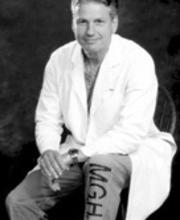HSCI Alumni: Joseph Vacanti, MD
Harvard Medical School

As a surgeon-scientist in the field of Pediatric Surgery and Transplantation Surgery, my major areas of investigation and interest began with two specific diseases that are highly lethal in children; namely congenital diaphragmatic hernia and congenital biliary atresia. These interests have led to the major theme of my laboratory effort, the field of Tissue Engineering. It became clear to me within the first two years of my career after training that the major problem in transplantation was insufficient donor organs, and that this was a specific manifestation of the general problem of every field of reconstructive surgery, that of insufficient tissue.
I then began the conceptual development of the design of implantable systems which would act as devices to generate new tissue as permanent replacement structures. These structures would then replace lost function. Working closely with Professor Langer at MIT, we developed an approach which used tissue-specific cells placed in devices composed of biodegradable, biocompatible polymers which, upon implantation, would signal vascular ingrowth while meeting the mass transfer diffusional requirements of the cells. The polymers would degrade by hydrolysis nonenzymatically and the device would be a permanent tissue formed as a chimera of donor elements and recipient elements.
This work has required the establishment of a multidisciplinary scientific approach composed of surgical scientists, chemical engineers, and cell and molecular biologists. We have studied several different systems not only to demonstrate proof of principle in broad areas of surgery, but also to uncover principles of design and biologic behavior. The work has now progressed into several clinical trials while the laboratory effort continues.
<h3">Bio-Sketch
Dr. Joseph Vacanti received his Bachelor of Science, summa cum laude, from Creighton University in 1970. He received his MD, with high distinction, from University of Nebraska College of Medicine, and an MS from Harvard Medical School. He trained in General Surgery at the Massachusetts General Hospital, in Pediatric Surgery at Children's Hospital, Boston, and Transplantation at the University of Pittsburgh.
Dr. Vacanti has been working in the field of tissue engineering since its beginnings in the early 1980s - a mission that stems from his long-held interest in solving the problem of organ shortages. His approach to developing tissue involves a scaffold made of an artificial, biodegradable polymer, seeding it with living cells, and bathing it in growth factors. The cells can come from living tissue or stem cells. The cells multiply, filling up the scaffold, and growing into a three-dimensional tissue. Once implanted in the body, the cells recreate their proper tissue functions, blood vessels grow into the new tissue, the scaffold melts away, and lab-grown tissue becomes indistinguishable from its surroundings
Dr. Vacanti has held academic appointments at Harvard Medical School since 1974. He has authored over 265 original reports, 62 book chapters and over 430 abstracts. He has 75 patents or patents pending in the United States, Canada, Europe, and Japan. Recent awards include the Thomas G. Sheen Award presented by New Jersey Chapter of the American College of Surgeons, recognition from the American Academy of Anti-Aging Medicine for contributions in the area of tissue replacement ,the James Bartlett Brown Award from the Society of Plastic and Reconstructive Surgery, and the Clemson Award from the Society for Biomaterials. In addition, he was recently elected to the Institute of Medicine of the National Academy of Sciences.
